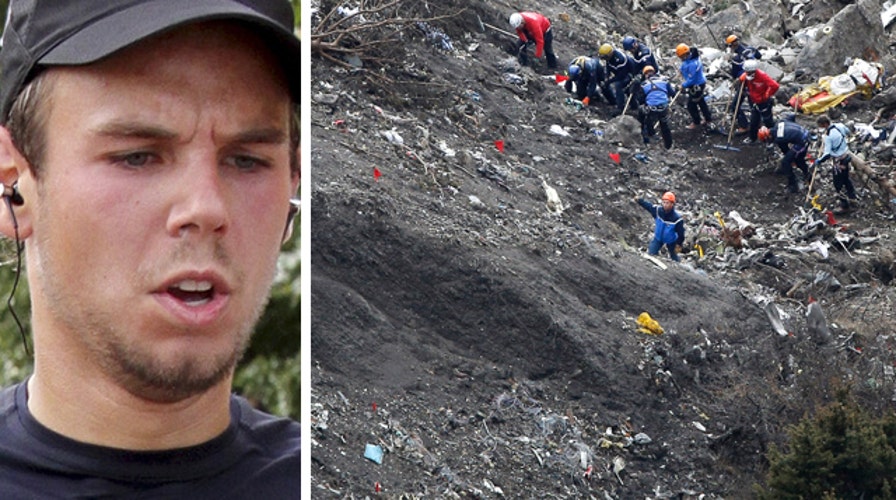Report: Germanwing co-pilot hid mental, physical illness
Co-pilot's ex-girlfriend said he 'wanted to be remembered'
New reports Saturday say Andreas Lubitz -- the copilot who crashed a jet into a French mountainside early Tuesday -- had been dumped the day before the crash, dreamed about crashing a plane and suffered vision problems, which could have cost him his job.
The new revelations emerged four days after the tragedy and painted a picture of a troubled man whose world, carefully hidden from his employer, friends and colleagues, was coming apart over broken romance, mental illness and vision troubles before the crash that killed 150 people.
The New York Post reported that the German newspaper Bild quoted an ex-girlfriend saying that Lubitz “would wake up in the middle of the night screaming, “We’re crashing!”
“When I heard about the crash, one thing that he said kept going through my head: ‘One day I’m going to do something that will change the whole system, and everyone will know my name and remember it.’ ” the woman told the paper, according to the Post.
“I didn’t know what he meant, but now it makes sense,” the woman added.
The Post also reported that French TV channel iTELE reported Lubitz and another girlfriend of seven years shared an apartment in Dusseldorf and planned to get married next year. However, the channel had said Lubtiz’s fiancée ended the relationship the day before the crash.
Authorities said the cockpit voice recorder showed Lubitz caused the crash. They said the German refused to let the jet’s captain reenter the captain and then rigged the auto-pilot to descend to its lowest setting, 100 feet. All on board were killed when the plane crashed into the Alps north of Nice at 6,000 feet. Captain Patrick Sonderheimber reportedly took an axe to the cabin door trying to get back into the cockpit as the plane plunged from the sky.
The Wall Street Journal reported that Lubitz’s eye difficulties were serious enough to ground him. Investigators told the paper that the 26-year-old had been examined by an eye specialist and that the appointments appeared to have taken place at University Hospital Dusseldorf.
The paper said evidence uncovered during searches of Lubitz’s apartment and his parents’ home indicated he had his eyes examined and was being treated for depression.
The Journal said the 27-year-old Lubitz was being seen by a neuropsychologist for depression. The doctor gave Lubitz a note excusing him from the work the day of the crash but he ignored the advice and reported to work, the paper said, citing its source, a person familiar with the investigation.
German prosecutors reported Friday that Lubitz shredded the doctor’s notes for the day of the crash and other days, supporting their assessment that Lubitz hid his “medical illness” from his employer and colleagues. They refused to say if the hidden illness was depression.
The Journal said that while Lubitz had sought to conceal his mental illness, there was no evidence that the fear of losing his medical classification as being fit to fly triggered his actions, though “this would be a plausible explanation,” the person said.
His pilot's license is up for renewal in July and would be in jeopardy if he was diagnosed as mentally ill.
The person told the Journal there was no evidence Lubitz was taking “mind-altering” medication that could have affected his judgment in the cockpit.
“When someone makes the same decision five or six times all leading toward one specific end you have to assume they are acting intentionally,” the person told the paper, alluding to Mr. Lubitz’s lack of reaction when urged by the pilot to open the locked cockpit door. Prosecutors said the cockpit voice recorder showed Lubitz breathing normally in the last moments of the flight, even as the pilot tried to get back into the cockpit and passengers screamed for their lives.
The Journal quoted a Lufthansa spokesman as saying: “All we know was that he had a clean background.”
Dusseldorf prosecutor Christoph Kumpa said Friday the doctor's note for the day of the crash indicated Lubitz "was declared by a medical doctor unfit to work."
Bild on Friday said Lubitz had been designated as "not suitable for flying" by his instructors at Lufthansa's training school in Arizona around the time that he halted his pursuit of a pilot's license in 2009.
The tabloid said Lubitz spent 18 months receiving psychiatric treatment, was diagnosed with a "severe depressive episode," and received what it called a "special regular medical examination."
Neighbors described a man whose physical health was superb and road race records show Lubitz took part in several long-distance runs.
Prosecutors said there was no indication of any political or religious motivation for Lubitz's actions on the Barcelona-Dusseldorf flight.
The Associated Press contributed to this report

